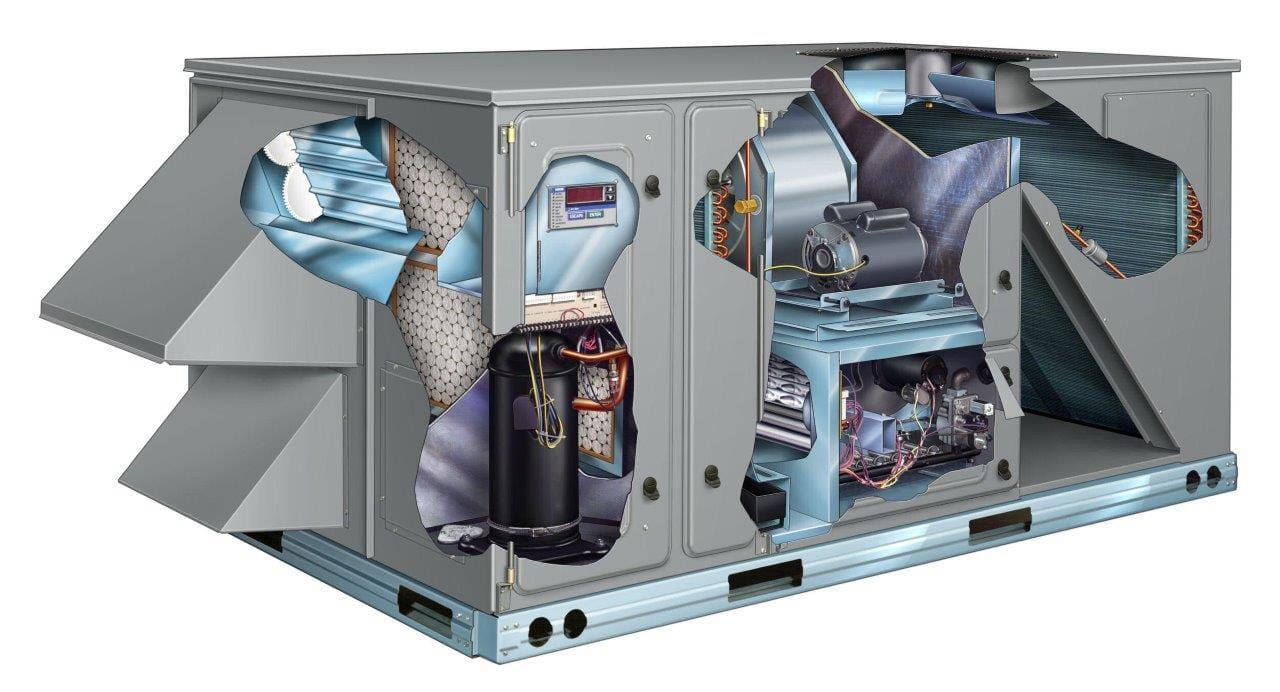
Rooftop package units, also known as rooftop HVAC units, have revolutionized commercial heating and cooling systems. Discover why businesses in Atlanta are opting for these space-saving and secure solutions provided by J & D Mechanical. In this comprehensive blog post, we delve into the inner workings of rooftop package units, highlighting their advantages, potential drawbacks, and crucial considerations. If you're seeking efficient and reliable commercial heating and cooling, look no further than J & D Mechanical's expertise in installing, repairing, and maintaining rooftop HVAC units. Contact us today for unparalleled service and satisfaction!
What Is a Rooftop Package Unit?
Typically, rooftop HVAC units are placed on the top of a building, but they can also be placed on a foundation at ground level. Buildings with flat roofs have enough space on top to accommodate the installation of HVAC equipment. By placing them on the roof, the systems are shielded from potential theft, and it also helps to save ground space.
Rooftop HVAC systems, also known as rooftop package units, include all heating and cooling components in a single cabinet. This cabinet is designed to withstand various environmental elements like sunlight, rain, wind, frost, and other conditions due to their exposure on rooftops.
Roof units and split systems differ in their setup. Split systems have indoor and outdoor components housed separately. Within the building, there is a furnace and/or air handler, while outside the building perimeter, an air conditioner or heat pump is installed.
What is the functioning mechanism of rooftop heating and cooling systems?
Rooftop HVAC units work in a similar way to other heating and cooling systems by delivering efficient comfort The systems connect to the building's ductwork and distribute conditioned air throughout the interior spaces to provide heating or cooling to the occupants.
The rooftop unit is supplied with air through an awning-like air hood located on its side. The air hood has an opening underneath it, which permits the entry of air while preventing rain and snow from getting in.
When air flows through, the dampers work internally to control the amount of airflow, and the air then goes through the filters in the system to eliminate any impurities.
Afterwards, the air can be warmed up using a heat exchanger or coils, or be chilled using cooling coils, depending on the system setup and how it is being used.
Finally, the fan pushes the conditioned air throughout the building's ducts.
Why Install Rooftop HVAC Units?
There are multiple factors that motivate business owners in the Atlanta region to select. to install facilities incorporate rooftop HVAC units for their cooling and heating needs.
Space Savings
In commercial establishments, there is limited available space. By placing all HVAC components on the roof, a rooftop unit allows for the preservation of indoor space that would otherwise be occupied by indoor equipment in a split system.
Security
Due to being installed on rooftops, HVAC units are mostly shielded from theft and damage. HVAC units installed on the ground are more susceptible to being accessed. If copper is stolen or the unit is vandalized, this could result in significant loss of production time for a business if the facility is left without proper heating or cooling.
Quiet Operation
Indoor noise is less noticeable when using a rooftop system because all the components are located outside the building. This helps minimize disturbances and distractions within the building.
Easy Access
Having all components enclosed in one unit, rooftop HVAC systems can provide technicians with easier access. This can lead to faster and more efficient maintenance and repairs as all the necessary parts are conveniently located in one place.
If you are considering installing a rooftop unit, there are certain factors you should take into consideration and perhaps avoid going ahead with it.
Not everyone will find rooftop HVAC units suitable. There are various factors that may lead you to consider opting for a different kind of commercial HVAC system.
Potential Roofing Damage
Rooftop HVAC systems are quite bulky and their excessive weight can result in harm to a flat roof covering if not properly installed. This can consequently lead to leaks and the accumulation of water, gradually deteriorating the integrity of the roof.
Storm Damage
Although rooftop units are designed to endure harsh weather conditions, they can still suffer from storm-related damage caused by lightning strikes, strong winds, and other weather-related factors. While split system components installed at ground level can also be affected by such damage, rooftop units are more prone to it.
J & D Mechanical specializes in providing heating and cooling solutions for commercial spaces.
We provide efficient heating and cooling solutions for buildings owned by businesses in Atlanta. Our team is skilled in installing, repairing, and maintaining rooftop HVAC units in and around the city. If you require service or replacement for your rooftop system, we are here to assist you. Contact us today To fulfill your commercial heating and cooling requirements, get in touch with the skilled specialists at J & D Mechanical without delay.
